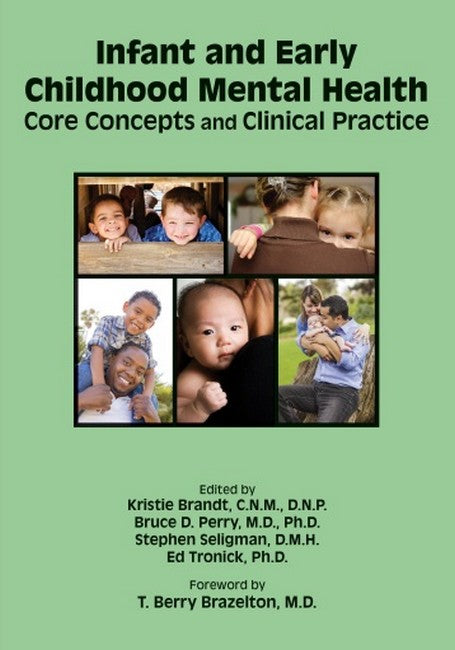Description
ContributorsForewordPrefaceAcknowledgmentsChapter 1. Core Concepts in Infant-Family and Early Childhood Mental HealthChapter 2. The Neurosequential Model of Therapeutics: Application of a Developmentally Sensitive and Neurobiology-Informed Approach to Clinical Problem Solving in Maltreated ChildrenAppendix 2--1: Initial Report for SuzyAppendix 2--2: Initial Recommendations for SuzyAppendix 2--3: Reevaluation Report for SuzyChapter 3. Typical and Atypical Development: Peek-a-Boo and Blind SelectionChapter 4. Brazelton's Neurodevelopmental and Relational Touchpoints and Infant Mental HealthChapter 5. The Neurorelational Framework in Infant and Early Childhood Mental Health Chapter 6. Attachment Theory: Implications for Young Children and Their ParentsChapter 7. Psychoanalytic and Psychodynamic Theory: Play Therapy for Young ChildrenChapter 8. Interpersonal Neurobiology, Mindsight, and Integration: The Mind, Relationships, and the BrainChapter 9. Basics of Counseling in Infant-Parent and Early Childhood Mental HealthChapter 10. Behavioral Epigenetics and the Developmental Origins of Child Mental Health DisordersChapter 11. DC:0-3R: A Diagnostic Schema for Infants and Young Children and Their FamiliesChapter 12. Fussy Babies: Early Challenges in Regulation, Impact on the Dyad and Family, and Longer-Term ImplicationsChapter 13. Developmental and Dyadic Implications of Challenges With Sensory Processing, Physical Functioning, and Sensory-Based Self-RegulationChapter 14. Autism Spectrum Disorders: The Importance of Parent-Child RelationshipsChapter 15. Touch in Parent-Infant Mental Health: Arousal, Regulation, and RelationshipsChapter 16. Developmental Psychopathology: Core Principles and Implications for Child Mental HealthChapter 17. Video Intervention Therapy for Parents With a Psychiatric DisturbanceChapter 18. Evidence-Based Treatments and Evidence-Based Practices in the Infant-Parent Mental Health FieldChapter 19. Transforming Clinical Practice Through Reflection WorkChapter 20. Attachment, Intersubjectivity, and Mentalization Within the Experience of the Child, the Parent, and the ProviderIndex

